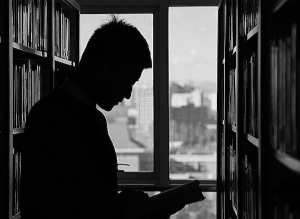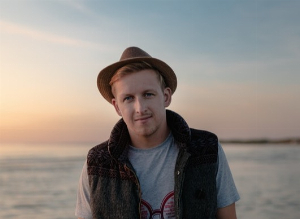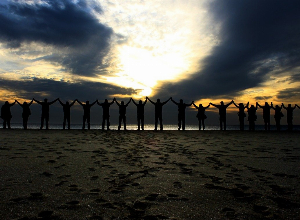Castleman disease: "From medical student to patient."
Published Sep 18, 2022 • By Alizé Vives
Raj is affected with idiopathic multicentric Castleman disease and is a member of CDCN.
He opens up about his diagnosis and his life with the illness.
Read his story below!

Hello Raj, thank you for having agreed to share you story with us on Carenity.
First of all, could you please tell us a little bit about yourself?
Hello, my name is Raj. I am currently working in a neonatal ward with the aim of becoming a neonatal pediatrician. I was diagnosed with idiopathic multicentric Castleman disease in 2013 at the age of 23. At that time I was a 2nd year medical student.
In what circumstances did you decide to see a doctor?
In the month before my diagnosis, I had become increasingly tired and out of breath, regularly falling asleep in class and becoming out of breath after climbing a single flight of stairs.
About three weeks before my hospitalization, my doctor had me do a blood test. When I looked at the results, I was baffled: many of the biological markers showed abnormal results. I knew what some of them meant individually, but I couldn't make sense of the whole picture. Over the next few days I noticed some other strange symptoms. My ankles had swollen and, after stepping on a scale, I realized that I had gained over 13 pounds in the previous weeks. When I saw my test results, my friends and family told me to go to the emergency room. So I did.
When I arrived at the emergency room and was asked why I was there, I said "hyperkalemia, edema and weight gain of over 13 pounds". I then sat back, proud that I had finally used the medical jargon properly. After about twenty minutes, my name was called and I was taken to a cubicle. After several hours of questioning and tests, I was told that I was going to be admitted to a hospital because my kidneys didn't seem to be working properly.
What happened after your hospitalization?
Over the next two days, my condition did not change. I had to explain my story more than a dozen times to different doctors from different departments, including hematology-oncology, nephrology and infectious diseases.
Every day they brought the results of my blood tests for me to see. The only thing I could tell from these results from my two years experience at a medical school was that they kept getting worse.
I remember one doctor admitting to me that he didn't really know what was happening to me, but then he uttered a well-known saying among medical professionals: "When you hear hooves, think horses, not zebras", meaning that doctors should focus on the most likely possibilities when making a diagnosis, and not on the most unusual ones.
One afternoon, after receiving the results of my scan, one of the interns sat on the edge of my bed. With a grim expression on her face, she told me that almost all my lymph nodes were enlarged. "Lymphoma?", I asked, curious to finally get some answers. She told me that it might be that, but they wouldn't know for sure until they did a biopsy of the bone marrow and the lymph nodes.
I immediately opened my computer and started googling the prognosis for lymphoma. Was it stage 3? Stage 4? Hodgkin lymphoma? Non-Hodgkin? Is a 90% survival rate at 5 years supposed to be good? Rather than being emotional, I seem to have opted for intellectualization as a psychological defense mechanism.
How was your diagnosis announced to you?
A week after I was admitted, my oncologist came into my room and told me that she finally had a diagnosis for me. "Have you heard of Castleman disease?" she asked. Having never heard of it in my two years of medical school, I said no. She explained that my kidneys and bone marrow were failing and that this disease was the cause. She said it was a rare disease, still not well understood, that it usually occurred in older patients and that I had the multicentric type, an even rarer type of Castleman disease with more widespread symptoms. She also said that the disease was idiopathic, which I knew meant that doctors had no idea what caused it.
When I first googled the disease, I found a brief and unhelpful Wikipedia page and a Castleman disease organization website that looked like it hadn't been updated for 10 years. I didn't know what to make of it all. Should I be happy that it wasn't cancer? Or was I to worry that my oncologist thought I might be the fourth case of idiopathic multicentric Castleman disease, according to his review of the literature? Even though I later learned this was not true, I continued to remain emotionally stoic and probably too physically weak to understand what was happening to me until I left the hospital.
What happened after?
"I'd like to start you on cyclophosphamide and etoposide this afternoon," my oncologist told me as I lay in my hospital bed two weeks into my stay.
I had never imagined that I would be receiving some of the strongest chemotherapy drugs that I was administering myself as a future doctor, and yet I was about to receive them. I couldn't help but think of all the side effects: hair loss, vomiting and blood in the urine.
Although my diagnosis was established, the treatments weren't working and I was getting worse. All my muscles and fat were atrophying. Despite the weight loss, I was retaining a lot of fluid in my legs and abdomen. So much that I needed a wheelchair to get around and someone to help me get dressed every day. With the amount of fluid I was retaining and kidneys that had deteriorated to the point of not producing urine, I was told I needed to start dialysis.
Three weeks later, I felt like nothing was working. Rituximab, chemotherapy, steroids, broad spectrum antibiotics, nothing seemed to help. Even the four-hour dialysis sessions every other day were not enough to stop the fluid building up in my lungs, which eventually required an incredibly painful procedure to remove it. The disease and the side effects of the drugs were taking their toll. I remember looking in the mirror at one point and seeing for the first time what cachexia (loss of muscle mass and fat) looked like. I was so physically weak.
How did you manage to find the right treatment?
While I was in hospital, my parents, who had to take a plane to come to see me, sought outside help. The hospital I was in was well known and reputable, but my parents could see that my doctors were not entirely comfortable with Castleman disease.
My parents contacted some friends and family members who were doctors, who in their turn questioned their own network of doctor friends. Eventually they found someone specializing in Castleman disease, who soon contacted my hospital about my case.
Towards the end of the third week, I was given what I later realized was the drug that saved my life, tocilizumab. Within a few days my kidney function started to improve and I was feeling better, to the point that six days after this one dose of tocilizumab, I was discharged from hospital.
What was the impact of the disease on your everyday life?
I spent the next few weeks at home, recovering, with regular visits to the lab and infusions of tocilizumab twice a month. My kidney function quickly returned to almost 100%, and I eliminated the equivalent of 0.5 to 0.7 gallons of water every day.
Two months after leaving hospital, I returned to medical school to resume my studies for my final exams.
How are you feeling today?
Today, I am proud to have stopped treatment and to have been in remission for almost six years. I am also humbled by my good fortune, as many patients with multicentric Castleman disease lose their battle with the illness, and those who survive need regular maintenance treatment.
What did you learn from your experience?
My experience gave me a unique perspective on medicine from the point of view of a patient and I am not sure I could have gained it in any other way. I hope that these memories will stay with me for a long time in my career as a doctor, to influence my medical decisions for the benefit of my patients.
Give it a "like" and share your thoughts and questions with the community in the comments below!
Take care!
Comments
You will also like

Testimonial - Castleman disease: "I was relieved to finally find out what I'd been suffering with!".
Jun 8, 2022

Castleman disease: "We will continue the search for a cure until all Castleman disease patients can live full lives!"
Apr 16, 2022

 Facebook
Facebook Twitter
Twitter
